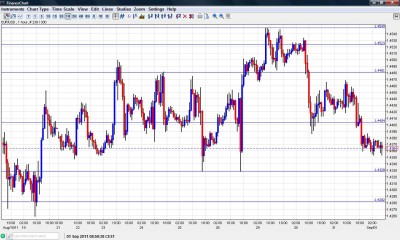Euro dollar remains pressured to the downside and falls to support in the wake of the new month. Finland insists on receiving collateral and this may delay the next package of aid for Greece or trigger a default. And in Greece, one bank was forced to request emergency aid. Today we get more hints towards the all important Non-Farm Payrolls in the US.
Here’s a quick update on technicals, fundamentals and what’s going on in the markets.
Update: Support at 1.4330 broken after a short struggle – the pair is headed lower
EUR/USD Technicals
- Asian session: A slow session with a narrow range under 1.44. The fall to support at 1.4330 came at the wake of the European session.
- Current range 1.4330 to 1.44.
- Further levels in both directions: Below 1.4330, 1.4282, 1.4220, 1.4160, 1.4070, 1.4030.
- Above: 1.4480, 1.4520, 1.4550, 1.4650, 1.47,
- The last two moves were of a sharp drop and then long consolidation. 1.4282 is significant support.
- 1.44 is now resistance, but 1.4480 is more important.
Euro/Dollar pressured – click on the graph to enlarge.
EUR/USD Fundamentals
- 6:00 German Final GDP. Exp. +0.1%. Actual +0.1%. Weakness confirmed.
- 8:00 European Final Manufacturing PMI. Exp. 49.7 points.
- 12:30 US Unemployment Claims. Exp. 409K.
- 12:30 US Non-Farm Productivity. Exp. -0.4%.
- 14:00 US ISM Manufacturing PMI. Exp. 48.7 points.
- 14:00 US Construction Spending. Exp. +0.2%.
- 16:00 US FOMC member Elizabeth Duke talks.
* All times are GMT.
For more events later in the week, see the Euro to dollar forecast
EUR/USD Sentiment
- Greek bailout questioned: If Finland gets what it wants – collateral from Greece, it might trigger the “negative pledge clause”, and make the default officials. Plus a possible credit event. Germany and France are pushing Finland to retreat but in the meantime, Austria thinks of joining Finland…
- European banks are fragile: One Greek bank had to ask for the ELA emergency fund as it lost access to liquidity. This adds to the urgent call by IMF managing director Christine Lagarde for mandatory recapitalization is needed. There are reports that EU officials are already working on “radical plans”. See more about the Dark Clouds Over Europe’s Banks.
- Non-Farm Payrolls awaited: This release on Friday, which is always important, can set the tone for QE3. The ADP report was OK. Today we get the weekly jobless claims (which impact the unemployment rate most) and the important manufacturing PMI. Note that we will not receive the Non-Manufacturing PMI (services sector) before the release. The services sector is by far the largest.
- FOMC Minutes somewhat dovish: The meeting minutes from the recent rate decision have shown that the central bank leans towards more easing, but not necessarily more QE. This comes despite three dissenters in the decision to keep rates low until 2013.
- ECB Sterilizes Bond Buying : The ECB continues keeping yields down. The ECB already spent above 40 billion euros in the current round of buying Italian and Spanish bonds in the past three weeks. It has managed to drain this money from the markets. Sterilized actions are positive for the currency. If this money isn’t drained – it’s QE.
- Trichet acknowledges weakness: The president of the ECB said that inflation risks are “under study”. German CPI showed a surprising drop in prices. This goes hand in hand with weak growth and weak business sentiment in Germany and across the continent. On the other hand, the Flash estimate still shows that the pace is at 2.5%. Will Trichet cut the rates before his term ends?

